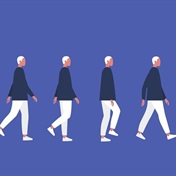Ordinary painkillers such as paracetamol may work better than the risky antipsychotic drugs often prescribed to calm agitation in people with dementia, according to a new study.
Patients with severe dementia showed significantly less agitation when taking ordinary pain medicines than a control group given standard treatment, showed the study, published online by the British Medical Journal.
Extreme aggression and agitation are common symptoms of advanced dementia, including Alzheimer's disease.
Such behaviour is distressing both for patient and family members, and a serious challenge to professional caregivers.
The condition is usually compounded by pain, and the frequent inability of the persons afflicted to clearly express the nature of their discomfort.
Powerful antipsychotics and antidepressants are often the drugs of first choice and, in many countries, are prescribed for agitation to around half of dementia patients in nursing homes.
Such treatment can be dangerous: In a population of about 180,000 dementia patients in Britain given antipsychotics, for example, there are 1,620 excess strokes and 1,800 excess deaths per year, according to a recent study.
"These figures emphasise the importance of finding safe and effective ways to reduce agitation and aggression in people with dementia," the researchers said.
Remarkably, little research has explored the effectiveness of off-the-shelf pain pills and other proven pain-relief drugs in quelling these common and debilitating symptoms.
Significant reduction
To find out just how well they might work, a team of scientists led by Dag Aarsland, a professor at the Karolinska Institute in Stockholm, treated 352 patients from 16 Norwegian nursing homes - all with severe dementia, most in their mid-to-late 80s - with one of four pain-relief medications.
Over a period of eight weeks, 70% took a large daily dose of paracetamol and 20% were given buprenorphine, a semi-synthetic opioid used to treat addiction and moderate-to-acute pain.
The other 10% took stronger painkillers, either morphine or pregabalin, an anti-convulsant.
A control group continued their usual treatment, including certain antipsychotics or anti-depressants.
Experts who did not know which patients had taken which drugs did interviews during the trial and a four-week follow up.
"The intervention produced a clinically and statistically significant reduction in agitation and pain," note Paul Rosenberg and Constantine Lyketsos, professors at John Hopkins University, in a commentary also published in the British Medical Journal.
The treatment "should give clinicians a new strategy for tackling agitation in subgroups of patients", they said.
Aarsland urged other researchers to confirm the findings in further studies.
Common problem world wide
Thirty-five million people worldwide have dementia, a number expected to more than triple by 2050 as populations across the planet age.
In Alzheimer's, the most common form of dementia, unwanted proteins form plaque in some areas of the brain, ultimately destroying neurons and leading to irreversible brain damage.
Typical symptoms are memory loss, erratic behaviour and, in advanced stages, extreme agitation.
Alzheimer's affects 13% of people over 65, and up to 50% of those over 85. - (Marlowe Hood/SAPA, July 2011)
Read more:
Alzheimer's & Dementia




 Publications
Publications
 Partners
Partners














